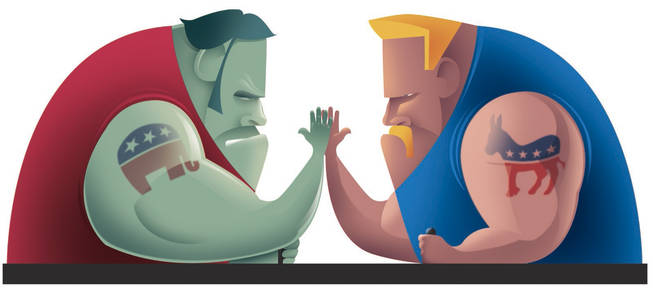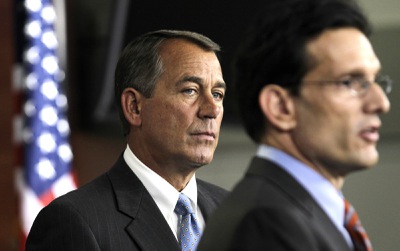Wednesday, Jan. 19, 2011 | 2:01 a.m.
DEMOCRAT HEALTH CARE STANCE
• About 129 million people with pre-existing conditions could lose insurance or exceed lifetime coverage limits. • Repeal will add $230 billion to the deficit over 10 years. • Law protects seniors, 22- to 26-year-olds who were pushed off parents’ insurance, and people with chronic ailments • Law controls costs by providing tax breaks for small businesses that provide health insurance. • Accuse Republicans of playing to the insurance companies, looking out for business, not individuals.
REPUBLICAN HEALTH CARE STANCE
• “Washington Knows Best” is the current phrase they’re using to push for the repeal. • Protect the doctor-patient relationship. The government is not the middle man between doctor and patient. • Cut spending and debt. Don’t pay for the program with taxes or by cutting Medicare. • “Obamacare” is destroying jobs. The uncertainty of the law is preventing hiring by small businesses. • Start over and this time avoid raising taxes and redirecting funding for other federal programs to pay for it.
Sun coverage
Sun archives
- Republicans hope for health care repeal, push Harry Reid for action (1-18-2011)
- Liberal group up with new ad on health care repeal (1-18-2011)
- Sides clash over cost of repealing health care law (1-7-2011)
- Repeal of health care bill tops agenda as GOP takes over House (1-5-2011)
- White House dismisses health care repeal effort (1-5-2011)
- Obama admin. hits back against health care repeal (1-4-2011)
- Senate Democrats vow to block health care repeal (1-3-2011)
- House GOP sending Obama a message on health repeal (1-3-2011)

Harry Reid

Joe Heck
This afternoon, when the GOP-led House of Representatives votes to repeal the health care law it took the last Congress almost a year and a half to pass, Republicans will be delivering as much as they can on what was perhaps their biggest campaign promise of the past election.
And with that, they’ll be casting the opening salvo for the next one.
With Senate Majority Leader Harry Reid dead set against any measure to pick off parts of the health care law — save for one piece, the overly onerous 1099 tax reporting requirement — the GOP’s push to repeal health care says less about immediate policy goals than it does about long-range political strategies.
But it’s reopening a more detailed debate about what health care law supporters say Americans stand to gain from the new system — or what those in favor of repeal say have they already lost. There are many areas where the parties disagree, but at the crux of each is a war of numbers.
Since the Democrat-led 111th Congress passed the health care bill almost a year ago, several provisions have gone into effect. Those include the mandate that insurance companies cannot deny coverage to patients with pre-existing medical conditions, lifting the age of eligibility for family insurance coverage from 22 to 26, reimbursement payments to senior citizens and tax breaks for small businesses that agree to provide coverage for employees.
With those provisions in effect, the Congressional Budget Office said this month that a repeal of the health care bill will add $230 billion to the growing deficit over the first 10 years, and another $1.2 trillion over the next 10 years.
That nonpartisan estimate let Democrats capture the flag of political efficiency from the Republicans that was only redoubled Tuesday when the Health and Human Services Department — part of the Obama administration — released its findings that a repeal of the law could force 129 million Americans under the age of 65 off their health care plans because they have some sort of pre-existing condition, or have exhausted lifetime benefit allowances for treatments of a chronic illness.
That number includes up to 1.2 million people in the Las Vegas metropolitan area — as well as the elimination of preventive care benefits for 333,000 seniors and Medicare “doughnut hole” reimbursements for another 32,800, and elimination of tax credits for an estimated 52,900 small businesses providing health insurance.
The local statistics, compiled by the Democratic policy staff of the House Ways and Means committee, also estimate a repeal of the health care law would raise costs for local hospitals by about $166 million annually.
“Current law is helping Nevadans with access to affordable guaranteed health coverage,” Rep. Shelley Berkley, D-Nev., said. “The loss of these protections would leave our neighbors, co-workers and loved ones vulnerable once again.”
Democrats are also pointing to jobs, saying that the health care sector, which is posting the fastest growth in a largely sluggish economy, would suffer as a result of a repeal. They counter the Republican rhetoric to repeal the “job-destroying” (formerly job-killing, pre-Tucson rampage) health care law, by saying that a repeal would in fact, destroy the potential to add hundreds of thousands of jobs to the economy in health care industries.
But the onslaught of damning figures have Republicans crying mathematical foul.
Republicans point out analyses of the health care bill before it became law showed the measure would cost more than $500 billion in the next decade — costs that were eventually offset with cuts to Medicare and new tax levies.
“This is a bill whose numbers don’t quite jibe, and that’s because of the gimmicky accounting in the workings of the bill itself,” House Majority Leader Eric Cantor said. “The underlying sense of the Obamacare bill is one of ‘Washington knows best.’ ”
Republicans, starting with House Speaker John Boehner, have waived the traditionally relied-upon CBO statistics as being but one opinion on the economic aspects of the debate.
“The present score says the repeal of the health care bill’s going to add $230 billion to the deficit ... but back in July, they said that passing the bill was going to cost $500 billion,” Nevada Republican Rep. Joe Heck said. “It’s very hard to quantify things that you think will or won’t happen in five or 10 years — it’s difficult for anybody, but especially with a health care bill.”
But the GOP is chiding Democrats for cooking the books on the uninsured. They argue that 129 million Americans under the age of 65 can’t really be in danger of suddenly losing their health benefits if only 17 million Americans were uninsured before the health care law was passed.
“Providing individuals with a pre-existing condition access to affordable coverage is a common-sense goal. It is not solely a Democrat goal or a Republican goal — it is a goal of all who want to make sure that patients have much-needed protections — regardless of their health condition or how they buy coverage,” said Rep. Dave Camp, R-Mich., chairman of the House Ways and Means committee and one of three who leadership will look at to come up with a replacement bill — one that lowers the cost of health care “without raising taxes or cutting Medicare.”
Still, the zeal to zap the health care law seems to have waned somewhat in the realm of public opinion. A recent poll by the Associated Press measured only 30 percent of the country as wanting to see the repeal go through. CNN/Opinion Research and Quinnipiac polls released Tuesday showed a closer margin, with about 50 percent in each favoring a repeal.
So whose numbers are right? It might not matter.
In the (very likely) event that a repeal effort dies on its way from the House to the Senate, Republicans have pledged to redouble their efforts by seeking to cut funding to the federal mandates in the health care bill at every opportunity, bit by bit, beginning, potentially, with the budget, which they have pledged to bring down to 2008 spending levels.
“Republicans want health care,” Cantor stressed to reporters Tuesday. “But we want to emphasize the doctor-patient relationship.”
Republicans offered an alternative bill last Congress that never came up for consideration, and hearings on a Republican replacement for health care are set to begin this week. But neither Cantor nor others would lay out a timeline for when they thought that replacement should be concluded or brought to a vote.
“This is not the end of the repeal of Obamacare,” said Rep. Steve King, who stumped for the health care repeal Tuesday with some of the most vocal anti-Obamacare conservatives. He said he’d like to see Congress resume its debate about health care through a series of smaller legislative measures on health — one to tackle tort reform, another on health care savings accounts, and so on — instead of one comprehensive measure.
But even King admitted that there was little point in the Republican Party doing much beyond pushing for a repeal right now.
“We’re marking time through 2011 and 2012,” he said, when the GOP figures it may have a more sympathetic president who would sign a repeal — or a majority in both houses of Congress that could force the president’s hand.



Join the Discussion:
Check this out for a full explanation of our conversion to the LiveFyre commenting system and instructions on how to sign up for an account.
Full comments policy